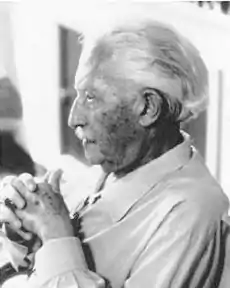Erik Erikson
Erik Homburger Erikson (* 15. jún 1902, Frankfurt nad Mohanom, Nemecko[1] – † 12. máj 1994, Harwich, Massachusetts, USA[1]) bol nemecko-americký vývinový psychológ a psychoanalytik rakúskeho pôvodu známy svojou teóriou psychosociálneho vývoja človeka a svojím pojmom „kríza identity“. Bol 12. najcitovanejším psychológom v 20. storočí.[2]
| Erik Homburger Erikson | |||
 | |||
| Narodenie | 15. jún 1902 Frankfurt nad Mohanom, Nemecko | ||
|---|---|---|---|
| Úmrtie | 12. máj 1994 (91 rokov) Harwich, Massachusetts, USA | ||
| Odkazy | |||
| Commons | |||
Dielo (výber)
- Einsicht und Verantwortung; Frankfurt a. M. (1964) 1971
- Identität und Lebenszyklus. Drei Aufsätze; Frankfurt a. M. 1966; 2. Aufl. 1973
- Der junge Mann Luther. Eine psychoanalytische und historische Studie. 1975.
- Gandhis Wahrheit. Über die Ursprünge der militanten Gewaltlosigkeit. 1978.
- Jugend und Krise; Stuttgart 1980
- Der vollständige Lebenszyklus; Frankfurt a. M. 1988; 2. Aufl. 1992
- Childhood and Society; New York 1950; deutsch Kindheit und Gesellschaft; Zürich 1957
Referencie
- "Erik Erikson, 91, Psychoanalyst Who Reshaped Views of Human Growth, Dies", New York Times, March 13, 1994.
- Haggbloom, S.J.; et al. (2002). "The 100 Most Eminent Psychologists of the 20th Century". Review of General Psychology 6 (2): 139–152
Externé odkazy
- Manfred Rosenbach, Entwicklung der Persönlichkeit - eine Abfolge »psycho-sozialer Krisen«
- C. George Boeree, Persönlichkeitstheorien: Erik Erikson
- Obituary May 13, 1994
- Erikson Institute
This article is issued from Wikipedia. The text is licensed under Creative Commons - Attribution - Sharealike. Additional terms may apply for the media files.